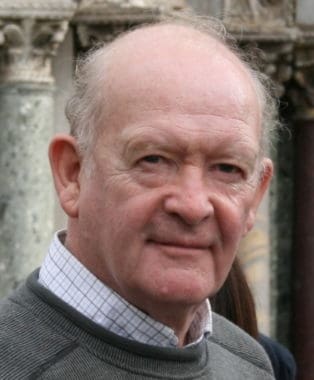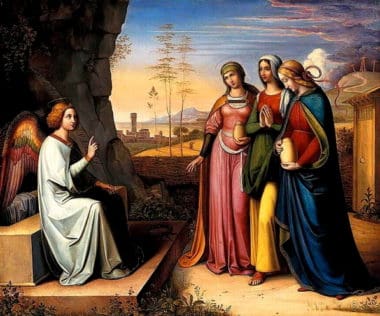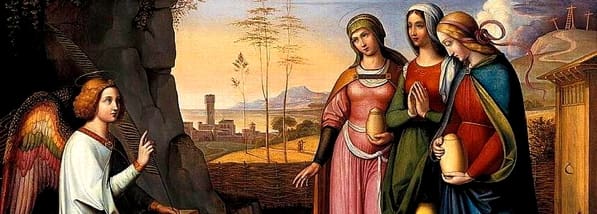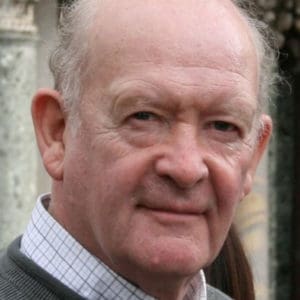Editor’s Note: Today, it gives us great pleasure to introduce to you, Mr. David Torkington. David is an English theologian who specializes in Prayer, Christian Spirituality and Mystical Theology. As well as being a prolific author, he also gives retreats and lectures extensively. Today, we feature his first post on our site. Please welcome him warmly and make him feel at home.
Inside the Holy Sepulchre
 Like a bolt from the blue I had a message from my old friend Fr. Kenneth Campbell. He was a Franciscan Priest who was born on the Island of Eriskay. He had spent years working in the Holy Land and had arranged a pilgrimage to Jerusalem for Gaelic speaking Catholics. However the Israeli government had suddenly asked him to escort the Canadian Foreign Minister and show him around the Holy Places. Could I therefore act as a ‘stand in’ because he couldn’t get back in time to meet the pilgrims at London airport? If I could, then after the formalities, I could board the plane with them and have a free holiday in the place that I had always dreamt of visiting, but had never had the time or the money to do so.
Like a bolt from the blue I had a message from my old friend Fr. Kenneth Campbell. He was a Franciscan Priest who was born on the Island of Eriskay. He had spent years working in the Holy Land and had arranged a pilgrimage to Jerusalem for Gaelic speaking Catholics. However the Israeli government had suddenly asked him to escort the Canadian Foreign Minister and show him around the Holy Places. Could I therefore act as a ‘stand in’ because he couldn’t get back in time to meet the pilgrims at London airport? If I could, then after the formalities, I could board the plane with them and have a free holiday in the place that I had always dreamt of visiting, but had never had the time or the money to do so.
Fr. Kenneth, who had lived and worked in the Holy Land for most of his life, seemed to have a key to every place that you really should see, and even to places that you shouldn’t! On the night before we left, his famous key opened a door to me that seemed closed to everyone else, and opened to me an experience that has affected me deeply to this day. Although the doors to the Holy Sepulchre are closed every night, and cannot be opened until the next morning no matter what, I was allowed to remain inside for the whole night, with a room to myself in the Franciscan friary within. I never went into that room. I spent all the time before the midnight office at Calvary, and the time after, alone in the ‘empty tomb’.
I was so overcome by the realization that I was actually praying in the very place from which Jesus had risen from the dead that I began to wish I that could spend the rest of my life in that friary. This would enable me to return again and again, night after night, to what must be the holiest place on earth. Then suddenly, in a matter of moments, I had a spiritual experience that changed everything. I didn’t see anything, I didn’t hear anything, but the words of God spoke to me in a way that they had never spoken to me before or since. In one sense it was nothing spectacular, but in another sense it irrevocably changed my whole attitude to the Resurrection that I’d believed in since I was a child, but which had never really touched me in the way that it touched me that night.
 I don’t claim that the words came directly from God; they most certainly came from my subconscious, but I’m sure God gave them a bit of a push. The words were these: ‘You are looking for Jesus of Nazareth who was crucified. See, here is the place where they laid him. He is risen now. He is not here. He has gone before you into Galilee.’ I changed instantly. I no longer wanted to live in that friary for the rest of my life. The empty tomb suddenly lost its importance, but not its significance. The meaning of the Resurrection struck me as never before, it was as if someone had said “ephphatha” and my eyes had been opened to a truth that I had known with my head, but which had never fully penetrated my heart. Although my spiritual understanding hadn’t substantially changed, it had been totally transformed in a way that I find difficult to put into words. It was as if I’d spent years looking at the Resurrection from the outside, as framed in a stained-glass window, then had suddenly seen it again, this time from the inside with the sun shining through it.
I don’t claim that the words came directly from God; they most certainly came from my subconscious, but I’m sure God gave them a bit of a push. The words were these: ‘You are looking for Jesus of Nazareth who was crucified. See, here is the place where they laid him. He is risen now. He is not here. He has gone before you into Galilee.’ I changed instantly. I no longer wanted to live in that friary for the rest of my life. The empty tomb suddenly lost its importance, but not its significance. The meaning of the Resurrection struck me as never before, it was as if someone had said “ephphatha” and my eyes had been opened to a truth that I had known with my head, but which had never fully penetrated my heart. Although my spiritual understanding hadn’t substantially changed, it had been totally transformed in a way that I find difficult to put into words. It was as if I’d spent years looking at the Resurrection from the outside, as framed in a stained-glass window, then had suddenly seen it again, this time from the inside with the sun shining through it.
The Resurrection, or what St John had called the glorification, meant that Jesus had been swept up out of the world of space and time in which he’d lived before, not to leave us alone, but to be closer to us than ever before, and as he promised ‘even to the end of time.’ Before the Resurrection, Jesus was limited by the physical body into which he had freely chosen to enter. His choice meant that he could only be in one place at a time, so meeting him would have been as difficult as meeting any major celebrity in our time. But that’s all changed now, because the same otherworldly power that raised him out of this world on the first Easter day enabled him to re-enter it on every day, enabling us to encounter him here and now, wherever we are.
The existential philosopher Martin Buber tells the story of the carpenter from Lubin in Poland who had a dream in which he saw a vast treasure reserved for him alone. After years travelling the world to find it, he returned home at the end of his life to find that the treasure had been there all the time beneath his own hearth, where he had warmed himself before the fire each evening. Like him, we can spend a lifetime searching elsewhere for what is here, where we are now, wherever that might be – in this present moment. The love, for which we were created and which Christ came to impart, can only be received here and now in the present moment, and at no other place than where we are. Now is the moment to harness all the time and all the effort, that could be wasted searching elsewhere, to abandon ourselves without reserve to the One, who first promised, and then sent, the love that can make all things new, beginning with ourselves.
The outpourings of the love of God that took place on the first Pentecost day, did not just happen in the past, two thousand years ago, it is happening continually, but we can only receive and experience it here and now in the present moment. We can receive it now, because the baptism that once symbolised our personal reception of the Holy Spirit, is not just an event that once took place in the past, any more than the events that happened on the first Pentecost. They both symbolised that the very personal and infinite love of God, is at this moment and at every moment being transmitted to us here and now, wherever we happen to be.
What happened at his resurrection was that the Jesus, who was once limited by the space and time world in which he had chosen to enter, was limited no more. His resurrection meant, and means now, that the love he received from his Father is continually pouring out to fill all who choose to receive it.
What his love had meant for the first Christians, the love of his Father had meant to Jesus throughout his life on earth. That’s why every moment of every day was the moment when he was opening himself to receive his love in his relentless daily prayer and in the way in which he served those for whom his Father had sent him. There was no moment, therefore, in which he was not open to receive the love of his Father. It was therefore in imitation of him, that the first Christians, did likewise. This enabled them to ensure that every moment of their day would be a moment to receive his love. Then this love would enable them to be drawn up into his continual and abiding presence, so that in, with and through him they would give glory to their Father in heaven, as he did and does now. What they would receive from God in return would enable them to experience something of that glory for themselves, and then show something of that glory to the world in which they lived, as it infiltrated and shone through everything that they said and did, as pure unadulterated goodness.
Editor’s Note: In part II, we will look at the impact of Pentecost.
Art/photography: David Torkington, used with permission. The Three Marys at the Tomb, Peter von Cornelius, between 1815 and 1822, PD-US, Wikimedia Commons.




